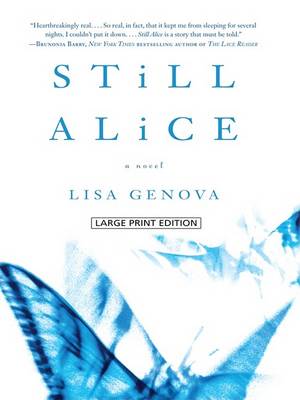Reviewed by lovelybookshelf on
Genova takes readers through so many emotions, helping us feel how complex dealing with this disease must feel to the patients and their caregivers. I laughed when Alice ordered ice cream: "'I'll have a triple-scoop Peanut Butter Cup in a cone, please.' Hell, I'm on Lipitor." I felt angry that her husband would leave her alone in the house for long periods of time, or when her daughter said, "She should try to recall the information on her own and not get lazy." Some of the scenes I found most profound were in the earlier stages, when Alice slipped in and out of confusion, aware of what was happening to her yet unable to control it, and acutely feeling the grief or humiliation that followed.
My husband asked me, "Why do you read books like that?" Fair enough; many parts of the story brought me to tears. I thought about two moments in the book. The first was Alice's realization that many of her friends and colleagues were uncomfortable around her. They wouldn't make eye contact with her, or they'd avoid her altogether. The second was later in the story, when Alice is listening to her family argue: "They talked about her as if she weren't sitting in the wing chair, a few feet away. They talked about her, in front of her, as if she were deaf. They talked about her, in front of her, without including her, as if she had Alzheimer's disease."
Because of my hospice volunteering training and limited interaction with people who have Alzheimer's, I thought I knew a good bit about this disease. I don't believe I'd ever really internalized what I'd learned, how it must feel to the patient, until reading this book. Yes, the content is difficult and often terrifying. But novels like Still Alice foster deeper insight, understanding, and a more human connection.
Reading updates
- Started reading
- 21 January, 2013: Finished reading
- 21 January, 2013: Reviewed
